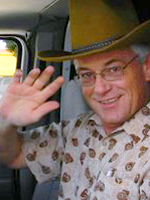Despite complaints, we've got the policing we want
Leon Worden · September 17, 1997
The American Civil Liberties Union says our Santa Clarita Valley Sheriff's Station generates a high number of complaints, primarily for discourtesy. But what do the ACLU's numbers mean? Have there been more complaints filed against SCV deputies lately than, say, ten years ago?
"It's like comparing apples and oranges," says Captain Michael I. Quinn, commander of the SCV station. "Ten years ago the watch commander would deal with (complaints), and only if he recommended it would it become a formal complaint. Today all complaints are documented and investigated. In this day and age we are mandated to document everything."
Moreover, Quinn says, even simple inquiries go down in the books as complaints. If somebody calls the station and asks, "Why was my son searched?" or "Why did the deputy make me put my hands on the car?" it gets a write-up.
"Complaints are down from what they have been, but they tend to be cyclical," he says. "A lot depends on if we put a special task force out, like the bike patrol we put out earlier this year. It generated a lot of inquiries, especially when they encountered teens drinking on the paseos or smoking in the park."
Writing up the complaint is the job of the watch commander, who forwards it to Quinn, who in turn decides which lieutenant will investigate it. The lieutenant contacts the deputies, the complainant and any witnesses, and determines if the complaint has merit. Where traffic stops are concerned, the lieutenant listens to the tape recording that most traffic officers make when they pull somebody over -- a sad necessity in these overly litigious times.
Complaints fall into one of three categories: "founded," meaning the deputies did something wrong; "unfounded," meaning the facts don't support the allegations; or "unsubstantiated," meaning it's the deputy's word against the complainant's and there is no independent witness.
Once the complaint is categorized as founded, unfounded or unsubstantiated, Quinn notifies the complainant in writing. Quinn will talk to any complainant personally and doesn't screen his calls.
It should be noted that the ACLU did not distinguish between founded, unfounded and unsubstantiated complaints when it decided that our local station is full of brutes. It also didn't differentiate between complaints and inquiries. The ACLU's numbers might not prove anything more than we Santa Claritans are an inquisitive bunch.
"About 96 percent of the complaints are determined to be unfounded," Quinn says, adding that about sixty to seventy percent result from citations. They get all kinds -- everything from the parent who doesn't understand why his 16-year old son was approached for smoking in the park, to people with what you might call the "Everyone else was speeding, so why was I the only one who got stopped?" mentality.
This is not to say unsubstantiated complaints are ignored, Quinn says. "Sometimes people will tip us off to behavioral problems in unsubstantiated complaints. When we see a pattern we deal with it."
"Discipline at our station has ranged from making entries in a performance log, which reflects negatively on a deputy's permanent record, to a formal written reprimand, to mandated time off or suspension or even firing."
Quinn adds that there are several ways for local residents to air their concerns. One way is to join or start a Neighborhood Watch group, which meets monthly with local deputies. A second way is through the brand-new Citizens Academy, a nine-week program beginning in October, where adults can get hands-on exposure to what our deputies are up against.
A third way is to attend a meeting of the Sheriff's Advisory Committee -- which, as it happens, meets tonight at 7 p.m. at the SCV Station at the corner of Magic Mountain Parkway and Valencia Boulevard. Members of the committee are your civilian neighbors, and they're more than willing to listen and deal with any grievances you might have.
I guess it boils down to something pretty simple. How many places in the greater L.A. area can you go where the cops actually care if your kids are getting drunk on the paseos or smoking pot in the park? Sure, that kind of law enforcement is going to generate some complaints. But I think it's the kind of law enforcement we want.
It's the kind of law enforcement that keeps little problems from growing into big problems. It's the kind of law enforcement that keeps us among the top four or five safest cities in the nation, year after year.
Look for the next Old Town Newhall Gazette inside your subscriber or newsstand edition of The Signal this Saturday!
Leon Worden is a Santa Clarita resident. His commentary appears on Wednesdays.
©1997 LEON WORDEN — ALL RIGHTS RESERVED

